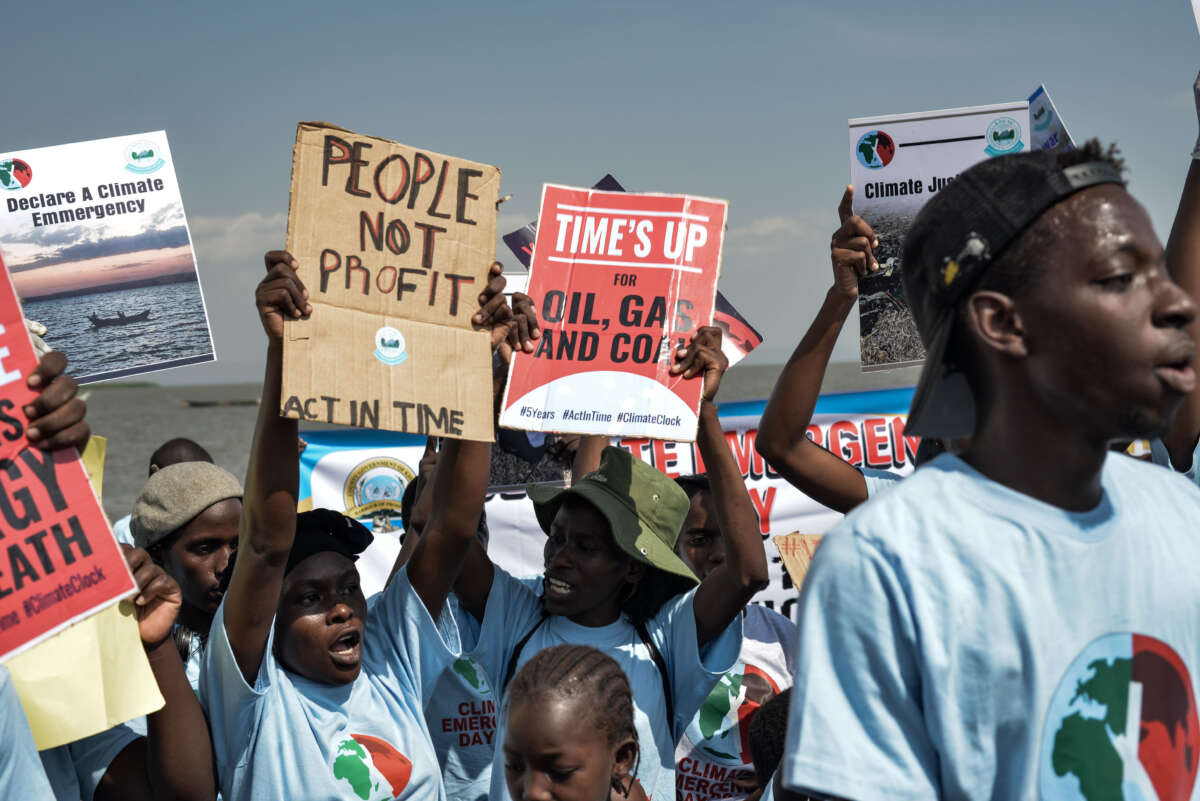Truthout is a vital news source and a living history of political struggle. If you think our work is valuable, support us with a donation of any size.
Activists around the world held a day of action on Saturday as the “Climate Clock” for the first time ticked below six years — signaling how far away humanity is from using up the remaining carbon budget to limit global temperature rise to 1.5°C.
“The five-year mark is not the end, it is a reminder that we still have a window of hope to prevent the worst impacts of climate change,” the Climate Clock team said Saturday, according to The Independent.
“The biggest misconception about climate is that its impacts are in the future,” the group added. “This summer shows the devastating impacts are now. We need to act like we are living in a climate emergency.”
ACTION ALERT! @theclimateclock is right in front of the Torentje (Netherland's Prime Minister Office) showing the deadline that indicates how long we still have to maintain < 1.5°C warming). The clock has ticked down from 6 to 5 years. #ClimateEmergencyDay 🌎 https://t.co/HEul08BhtL
— CLIMATE CLOCK (@theclimateclock) July 22, 2023
The milestone comes as much of the Northern Hemisphere faces extreme heat during what Malta residents are calling the “summer of hell” and scientists continue to warn about the dangerous consequences of continuing to warm up the planet.
The Climate Clock website says that for #ClimateEmergencyDay, people took to the streets to “mark this moment with synchronized actions, bringing clocks from climate impact zones to the halls of power, demanding that governments and corporations #ActInTime to meet our climate deadline, and enact the real, systemwide solutions we need.”
In addition to arming activists with portable “action clocks” and the code to install “digital clocks” on websites, the Climate Clock team in recent years has installed “monumental clocks” in major cities, including Berlin, Germany; Glasgow, Scotland; Seoul, South Korea; and Rome, Italy.
Activists gathered at Union Square in NYC in front of the monumental #ClimateClock as the deadline ticked from 6 to 5 years for the first time in history. #ClimateEmergency poses an important question: what climate legacy are we building? #ActInTime pic.twitter.com/4GYoaWTkRv
— CLIMATE CLOCK (@theclimateclock) July 22, 2023
The display in New York City’s Union Square was unveiled nearly three years ago. Spectrum News NY1 reported Saturday that dozens of activists gathered at the NYC clock to demand reductions in planet-heating emissions, particularly from fossil fuels.
“We need to get the world, corporate, government leaders, and civil society all synchronizing our climate watches, which is getting on the same timeline and making progress on systemic solutions to the crisis,” said Climate Clock co-creator Andrew Boyd.
In Rio de Janeiro, Brazil, the clock was displayed on the Christ the Redeemer statue. The group explained on Twitter that “proposed solutions were projected at the bottom in blue. These included: eliminate fossil fuels, protect Indigenous territories, zero deforestation in biomes, ambitious climate commitments, and many more.”
Climate Clock projected on Rio de Janeiro’s Christ the Redeemer statue to show how much time the world has to slow global warming to avert disaster
— Anadolu English (@anadoluagency) July 23, 2023
🎥: Fabio Teixeira pic.twitter.com/ygWzQUSv1I
Participants of other actions worldwide shared footage on social media with the hashtag #ActInTime.
Some people held marches, from young Nigerians in Abuja to Tanzanian activists and scientists in Dar es Salaam. In Liberia, a group with a portable clock visited a community where residents have lost their homes due to sea-level rise.
Others joined in online, sharing photos of “5 years” written on their palms along with calls for climate action.
The five year mark is not the end, it is a reminder that we still have a window of hope to prevent the worst impacts of climate change. Each hand, each territory, each voice has to be part of this collective search for climate justice. #5year #ActInTime #ClimateEmergencyDay pic.twitter.com/e5xHd3Mpgr
— CLIMATE CLOCK (@theclimateclock) July 22, 2023
“Action is needed now,” declared Sabine Fuss, who leads a working group at the Mercator Research Institute on Global Commons and Climate Change in Berlin. The Climate Clock is based on data from the institute.
“Energy infrastructure and structural change is not something that you do in a couple of months. It’s something that needs years,” Fuss told The Verge. “Even if you have marginally more time, it still means that you have to act immediately.”
Parties to the 2015 Paris agreement — which aims to limit global temperature rise this century to 1.5°C — are preparing to head to Dubai in November for the next United Nations climate summit, COP28.
Campaigners worldwide continue to express concern that the U.N. conference’s president-designate is Sultan Ahmed Al Jaber, CEO of the United Arab Emirates’ national oil company.
A terrifying moment. We appeal for your support.
In the last weeks, we have witnessed an authoritarian assault on communities in Minnesota and across the nation.
The need for truthful, grassroots reporting is urgent at this cataclysmic historical moment. Yet, Trump-aligned billionaires and other allies have taken over many legacy media outlets — the culmination of a decades-long campaign to place control of the narrative into the hands of the political right.
We refuse to let Trump’s blatant propaganda machine go unchecked. Untethered to corporate ownership or advertisers, Truthout remains fearless in our reporting and our determination to use journalism as a tool for justice.
But we need your help just to fund our basic expenses. Over 80 percent of Truthout’s funding comes from small individual donations from our community of readers, and over a third of our total budget is supported by recurring monthly donors.
Truthout’s fundraiser ended last night, and we fell just short of our goal. But your support still matters immensely. Whether you can make a small monthly donation or a larger one-time gift, Truthout only works with your help.
